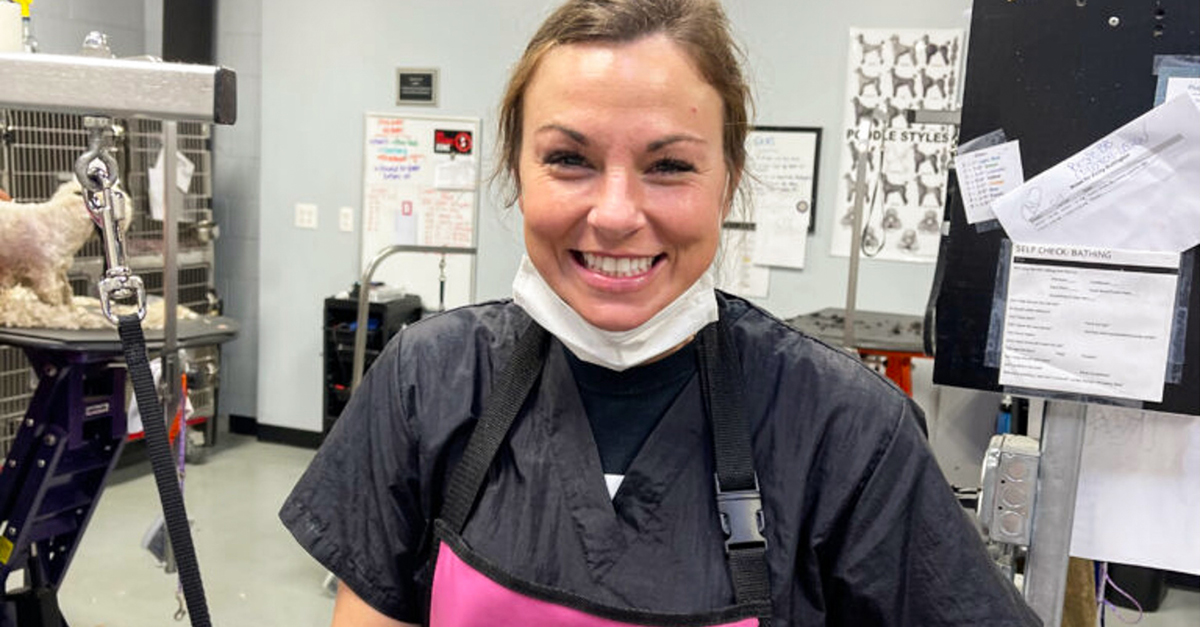Surviving childhood trauma and the hardships of poverty and addiction can turn little things into big deals. For April, it was getting her personalized grooming scissors, a milestone for students at Pawsperity. Half-way through her seven-month training program, the scissors represented a hopeful future for the first time in her life.
“Looking back as a little girl, I didn’t dream of going to college or being a doctor,” April says. “I was never in a place to look at my future because I was always worried about how I was going to eat today.”
April grew up poor. She’s the daughter of a single mom who also grew up poor. That’s called generational poverty, which gets passed down from one generation to the next, along with hopelessness, a scarcity mindset, and toxic stress. It’s far more insidious and difficult to overcome than situational poverty, which is usually caused by a change, such as a job loss or divorce.
Hope was absent in April’s childhood. So were healthy role models and a safe home; April and her sisters experienced abuse.
“That’s when my mom left,” April says. “My mom didn’t get a chance to heal, and she went into survival mode. We are all addicts—my dad was alcoholic, one sister is addicted to meth, and another sister is in federal prison. We had periods of having our lives together and then lost it all. It’s exhausting.”
April, now 40, started taking drugs and drinking at a young age and continued to struggle her entire life with poverty and addiction. “I spent my twenties working to pay off five DUIs,” she says.
The poverty, addiction and domestic violence April grew up around became a vicious cycle. She married once and had a son, but abuse and addiction soon ended the marriage. She lost custody of her son, and her drug use and drinking led to homelessness for the better part of 5 years, until she became pregnant with a daughter. She was clean and sober off and on for a few years, when eventually her daughter’s father, also an addict, became violent and went to jail. April’s addictions worsened, as addictions do, and so did her problems.
“I started stealing and gambling, was in and out of jail, and my daughter ended up in foster care,” April says. “I used to judge women whose children went to foster care, and now I understand. It happens so fast. When you are high and drunk, you make bad choices.”
Finally, hopelessness became a doorway to getting help.
“I thought, ‘Oh my god, I’m destroying my life,’” April says. “Turns out this was a Godsend. There is no way I could clean up everything to build a life without help.”
Pawsperity is that help. April needs job training, and the ability to make a livable income will be life-changing, but that alone is not enough to stabilize her life. Classes in parenting, financial literacy and interpersonal skills would prove essential, and she would have little progress without dealing with her outstanding warrants .That’s where Pawsperity’s case management team comes in. They can help students resolve their sometimes overwhelming legal obligations. The case management team chipped at it little by little and were able to help April clear all of her warrants.
With more than a year clean and sober and thoroughly enamored with the idea of having a future working with dogs, April is now fueled by hope.
“You have to be sober to know you deserve better,” April says. “You need to be willing to work as hard as it takes to get out and stay out. You have to feel you are worth it.”
When April started her training, she wasn’t entirely sure she could handle the dogs. “It was stinky and I was scared of the dogs, but I realized the dogs could feel me being afraid,” she says. “I’m not afraid anymore. Now I love the dogs. I never imagined I could love doing this so much.”
April’s experience working with dogs reflects the therapeutic nature of the human-animal bond.
“Some of the dogs are misunderstood, like us,” she says. “I love to get the ones that are matted, scared and shaking. You start working on them and brush out the matts and they switch from being scared of you to kissing you. I love seeing them transition from a scared dog to a loving, grateful dog.”
In the few months she’s been training at Pawsperity, April now has dreams. Her goal is to switch her mindset from what she can’t be to imagining herself in a full-time job as a groomer and perhaps having her own shop. She wants to put her own spin on the grooming world.
The most hopeful part of April’s story is that of her relationship with her children. Her son is now 17 years old and a straight-A student living in Indiana with his father. He visits April during school breaks. Her 11-year-old daughter is also a straight-A student and lives with her father and April.
“Even though I would expect my kids to think badly of me, they respect and love me and are proud of what I’m doing,” April says. “I can’t wait to start working and show them I can take care of them.”
April’s greatest hope is to pass down to her children what she is learning today—the ability to earn a living wage so she can be independent and have more time with family.
And that’s the how the cycle is broken.
